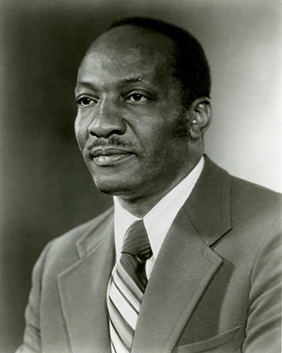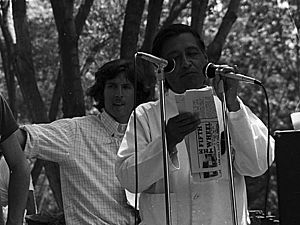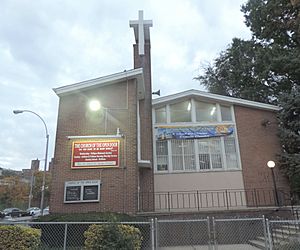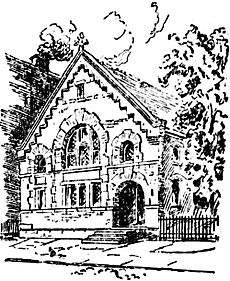W. Sterling Cary facts for kids
Quick facts for kids
W. Sterling Cary
|
|
|---|---|

Cary in the 1970s
|
|
| President of the National Council of Churches | |
| In office December 7, 1972 – October 11, 1975 |
|
| Preceded by | Cynthia Clark Wedel |
| Succeeded by | William Phelps Thompson |
| Personal details | |
| Born |
William Sterling Cary
August 10, 1927 Plainfield, New Jersey, U.S. |
| Died | November 14, 2021 (aged 94) Flossmoor, Illinois, U.S. |
| Education | Morehouse College (BA) Union Theological Seminary (BD) |
William Sterling Cary (born August 10, 1927 – died November 14, 2021) was an American Christian minister. He made history as the first Black president of the National Council of Churches (NCC). He held this important role from 1972 to 1975.
Cary grew up in Plainfield, New Jersey. He earned his college degree from Morehouse College in 1949, where he was also the student body president. He became a Baptist minister and continued his studies at Union Theological Seminary. He received another degree in 1952. When he couldn't find a job at a Baptist church, he became a pastor at a Presbyterian church in Ohio. Later, he worked at a special church in Brooklyn that welcomed people from different Christian groups. In 1958, Cary joined the United Church of Christ (UCC). During the 1960s, he became very active in the Black liberation theology movement. He worked hard for racial fairness and equality within his church and across the country.
In 1968, he was chosen to lead the New York Metropolitan Association of the UCC. Four years later, everyone voted for him to be the president of the National Council of Churches for three years. Cary often spoke out against President Richard Nixon's budget cuts. These cuts affected programs for affordable housing and helping people in poverty. He also disagreed with President Gerald Ford about the Vietnam War. However, Cary and Ford helped improve the relationship between the NCC and the White House. Ford later asked Cary to join a group that helped refugees from Southeast Asia settle in the United States. After his time as NCC president, Cary continued to serve as a leader for the Illinois conference of the UCC until he retired in 1994.
Contents
Early Life and School Years
William Sterling Cary was born in Plainfield, New Jersey, on August 10, 1927. His father, Andrew Jackson Cary, worked as a real estate agent. His mother, Sadie Walker, took care of their home. William had seven brothers and sisters. As a child in Plainfield, he was active in the Boy Scouts of America. He went to Washington School, where he helped start the junior high YMCA club. He was also the president of his eighth-grade class. In 1944, a local newspaper called him "the boy preacher." This was because he gave a sermon for Young People's Day at a local AME church.
He finished high school at Plainfield High School in 1945. After high school, he chose to go to Morehouse College in Atlanta, Georgia. This college was for Black students. At Morehouse, Cary studied sociology. He sometimes went back to Plainfield to preach at Calvary Baptist Church. By 1947, he was an assistant pastor there. He was part of the Kappa Alpha Psi fraternity. In 1948, he was elected student body president. That same year, he became a Baptist minister. He graduated with his college degree in 1949.
Cary continued his education at Union Theological Seminary in New York City. While studying, he also helped the minister at Grace Congregational Church. In 1950, he was elected class president for his second year. He was the first Black class president in the seminary's history. The next year, he was elected student body president. He earned his Master of Divinity degree in 1952.
Starting His Ministry
After finishing seminary, Cary worked in a factory for a short time. This was because he couldn't find a job at a Baptist church right away. In 1952, he moved to Youngstown, Ohio. There, he became the pastor of Butler Memorial Presbyterian Church until 1955. During this time, he helped lead the United Negro College Fund in Youngstown. He was also involved in other local groups like the YMCA.
On July 11, 1953, he married Marie Belle Phillips. She was a teacher. They got married in Pittsburgh, Pennsylvania. They later had four children: Yvonne, Denise, Patricia, and W. Sterling Jr. In December 1955, Cary was asked to be the pastor at a special church in Brooklyn. This church, called the Church of the Open Door, welcomed people from different Christian groups. It was the first church of its kind built in a public housing area in the United States. He started his new job on January 1, 1956.
In July 1958, Cary became the pastor at Grace Congregational Church. This was the same church where he had helped out as a student. He changed his church group from Baptist to the United Church of Christ (UCC). He started his new role on September 1, 1958. Cary often took part in talks about problems facing young people. He was also a speaker at a big rally in 1963 with the New York NAACP. He spoke often about racial issues in the 1960s. After the Harlem riot of 1964, he asked for a police officer to be suspended. He also wanted a group of citizens to look into claims of police unfairness.
Working for Justice
In 1965, the United Church of Christ chose Cary to lead a new group called the "National Committee for Racial Justice Now." At a UCC meeting in 1966, he spoke strongly against groups like the Ku Klux Klan. He called for good schools for everyone and fair job laws. In March 1966, he became the main leader of this committee. At that time, he was also a vice president of the Protestant Council of the City of New York. He was also part of the Mayor of New York's team for youth issues.
Cary worked for racial justice both inside and outside the UCC. He asked the UCC to give more money to build churches in Black communities. He also helped start the "National Committee of Negro Churchmen." This group supported the Black Power movement. They even bought a full-page ad in The New York Times. In this ad, they asked for changes to unfair school and housing laws.
In September 1966, Cary continued to speak about the Black Power movement and Black liberation theology. He said that "equality will come not by goodwill or love, but by the Negro's achieving independence, strength and some measure of wealth." After his talks, church leaders voted to support several ideas about race. These included asking the state government for fair housing laws. They also encouraged churches to hire more Black pastors. Cary also asked the UCC to protect ministers who spoke out on important topics like racial issues or the Vietnam War. He also criticized churches for firing some outspoken ministers.
In June 1968, he was chosen to lead the New York Metropolitan Association of the United Church of Christ. In this job, he looked after 77 churches and about 36,000 UCC members. He was the first Black minister to hold this position. In 1969, he signed the Black Manifesto. This document asked white churches and synagogues to pay money to make up for past wrongs related to slavery.
Leading the National Council of Churches
In September 1972, newspapers reported that Cary was likely to become the next president of the National Council of Churches (NCC). The NCC is the largest group of different Christian churches in the United States. He ran without anyone opposing him. On December 7, 1972, he was unanimously elected to a three-year term. This happened at the NCC's meeting in Dallas, Texas. Cary took over from Cynthia Clark Wedel. He was the first Black president of the NCC and its youngest president at that time.
When he was elected, he promised to focus on bringing churches together and helping different groups unite. He also promised to work for affordable housing and good education for everyone. In February 1973, Cary joined other religious leaders. They criticized President Richard Nixon's proposed budget. This budget would cut money for affordable housing and programs to help people in poverty. Cary said Nixon was "declar[ing] war on the poor people and members of this country's minorities." He asked Congress to reject the budget. After Nixon fired Archibald Cox during the Watergate scandal, Cary asked Congress to look into whether the President should stay in office.

In May 1973, he received an honorary Doctor of Laws degree from Bishop College in Dallas. This was for his work in promoting justice for all. That same month, Cary and another NCC leader apologized for a statement they had sent to Congress. The statement was against tax breaks for students going to private schools. They took it back after Catholic leaders complained. Cary strongly supported the United Farm Workers' grape strike led by Cesar Chavez. In 1974, he spoke out for forgiveness for people who avoided serving in the Vietnam War. He later praised President Gerald Ford for offering some forgiveness. But he asked Ford to make it complete.
In September 1974, Cary moved to Chicago, Illinois. He was elected the executive minister of the Illinois Conference of the United Church of Christ. He was the first Black executive minister in that conference's history. In February 1975, Cary and other religious leaders met with President Ford at the White House. This was the first time in ten years that church leaders were invited. This meeting helped rebuild the relationship between the NCC and the White House. However, Ford and the church leaders still disagreed on some issues, like forgiveness for war evaders and aid for Vietnam.
After the Vietnam War ended, President Ford asked Cary to join a group. This group helped oversee the settlement of refugees from Southeast Asia. The NCC also voted to support the Equal Rights Amendment. They also decided to look into Cary's claim that the Nixon administration had tapped NCC phones. Cary strongly criticized "Operation Babylift." This was when children were quickly moved from South Vietnam to the United States. He said the U.S. government did it for political reasons. He also said that Vietnamese people called it an "insensitive kidnap operation." Ebony magazine named Cary one of the 100 most important Black Americans in both 1974 and 1975. Cary's three-year term as NCC president ended on October 11, 1975. William Phelps Thompson was elected as the new president.
Later Years and Retirement
After his time as NCC president, Cary continued his work as the Illinois conference minister. He kept calling for Black churches to fight against racial unfairness. In 1981, he was chosen to lead the Council of Conference Executives of the UCC. In 1989, Cary was one of six people considered to be the next UCC president. However, he was not chosen for the job. He retired in 1994 after serving for twenty years as the Illinois conference minister.
Death
After a long illness, William Sterling Cary passed away from heart failure at his home in Flossmoor, Illinois, on November 14, 2021. He was 94 years old. He was survived by his wife, Marie Belle, whom he had been married to for 68 years. He also left behind his four children, two grandchildren, and three great-grandchildren.
 | Frances Mary Albrier |
 | Whitney Young |
 | Muhammad Ali |



